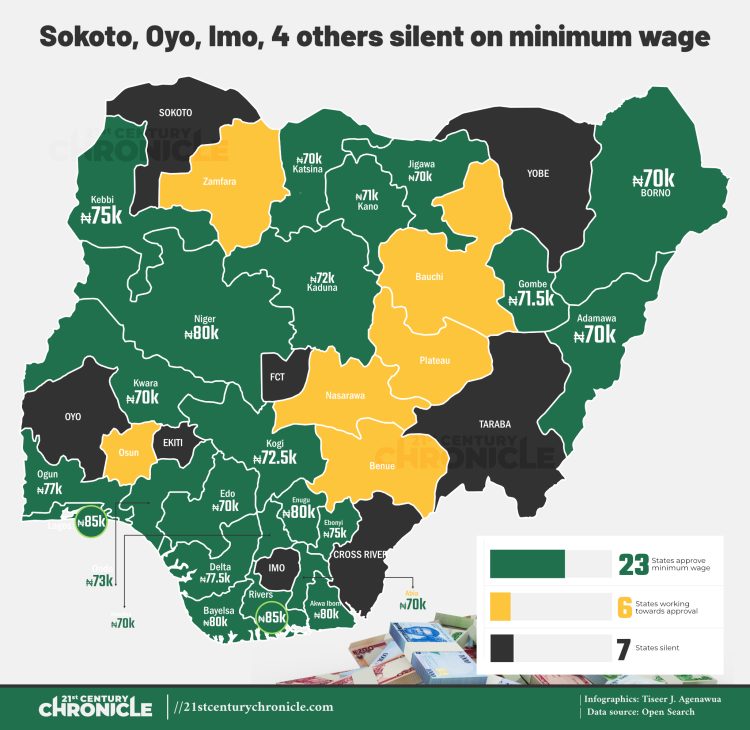Sokoto, Imo, Taraba, Oyo, Cross Rivers, Ekiti and Yobe states are keeping sealed lips on the issue of N70,000 minimum wage as 23 others approved the pay rise for their workers.
Findings by this newspaper on Wednesday revealed that six other states comprising Zamfara, Benue, Nasarawa, Osun, Bauchi, Plateau and Osun are at various stages of implementation, with many of them setting up panels for the minimum wage.
The 23 states that approved the minimum wage include Lagos, Borno, Rivers, Bayelsa, Niger, Enugu, Akwa Ibom, Abia, Adamawa, Anambra, Jigawa, Gombe, Ogun, Kebbi, Ondo, Kogi, Kwara, Kaduna, Kano, Ebonyi, Katsina, Edo and Delta.
21st CENTURY CHRONICLE reports that President Bola Tinubu signed the new minimum wage into law on July 29, 2024, after meeting with leaders of the Nigeria Labour Congress (NLC) and the Trade Union Congress of Nigeria (TUC).
The new monthly minimum wage, representing a 133 percent increase from 30,000, is coming at a time when inflation has peaked at over 32 percent, limiting purchasing power, and fueling economic hardship triggered by petrol subsidies removal, flouting of the naira, among other economic reforms embarked upon by President Tinubu in the last one year.
Some state governors have gone ahead to approve figures above the N70,000 stipulated minimum wage. Governor Babajide Sanwo-Olu of Lagos had approved N85,000, saying he would likely jerk it up to N100,000 by January next year.
Also, Governor Siminalayi Fubara of Rivers has approved N85,000, Governor Mohammed Umaru Bago of Niger (N80,000), Governor Dapo Abiodun of Ogun (N77,000), Governor Inuwa Yahaya of Gombe (N71,500), and Governor Kabir Abba Yusuf of Kano (N71,000).
The new minimum wage was approved at a time the federal revenue allocations to the three tiers of government rose by 149.4 percent in the last one year.
Data from the National Bureau of Statistics (NBS) revealed that the disbursements from the Federation Account Allocations Committee (FAAC) to the federal, state and local governments rose to N13.72 trillion year-on-year, between January and July 2024, from N5.5 trillion in the corresponding period of 2023.
The report showed that in the first seven months of 2024, the federal government received N2.68 trillion, up by 28.2 percent, from the N2.09 trillion it received in the first seven months of 2023.
The 36 states got N2.91 trillion in the year under review, representing a 62.5 percent increase from the N1.79 trillion it got in the first seven months of last year. The 774 local governments earned N2.04 trillion within the period, up by 43 percent from N1.44 trillion in the first seven months of 2023.
EDITOR’S NOTE: This story was updated to include Borno state which is one of the 23 states that approved the new minimum wage.









